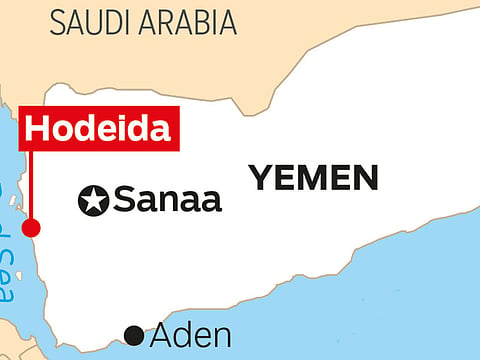Iran under pressure to curb Al Houthi support
European powers have been pressing Tehran to be less aggressive in the region linking it to the nuclear deal

Dubai: Iran and European officials say that Tehran is more willing to press their Al Houthi proxies in Yemen to come to the negotiating table amid a blistering Yemeni government offensive on the Red Sea Coast which has severely crippled the militant gorup.
Speaking to Reuters on the condition of anonymity, the officials say Iran is coming under more pressure to limit its regional meddling after US President Donald Trump pulled the US out of a nuclear deal with Iran.
Iran’s regional rivals, Israel and Saudi Arabia, welcomed Trump’s decision to drop the deal on May 8, saying that the pact failed to curb Iran’s “malign behavior in Syria, Yemen, and other places all around the world”.
In November, Iran for the first time acknowledged being involved in the Yemen conflict when Mohammad Ali Jafari, the head of its elite Revolutionary Guards, said Iran provided advisory assistances to its allies in Yemen.
To shield Iran from new US sanctions, the European powers have been pressing Tehran to be less aggressive in the region, including in the civil war in Yemen.
“The Iranians have given indications that they are now willing to offer their services to liaise with Al Houthis to move forward,” said a European official, speaking on condition of anonymity.
“The Iranians are now at least recognising there is a channel. They obviously aren’t saying they control Al Houthis and they never will, but they recognise they have a certain influence on them and ready to use those channels. That’s new.”
Iran’s senior nuclear negotiator Abbas Araqchi said talks on the Yemen conflict were being held in parallel to the nuclear talks with the European signatories of the accord, under which Iran accepted to curb its nuclear work in return for the lifting of international sanctions.
A second European official said the discussions with Iranians on Yemen were going “very well”.
Washington, Paris and London all back Riyadh in its intervention in Yemen and all supply weapons and intelligence to Saudi Arabia.
Araqchi said Iran and European powers will meet in mid-June in Brussels to further discuss the Yemen conflict.
France, which has stressed the importance of supplementing the nuclear deal with substantive talks on other issues, is due to co-host an international conference on Yemen with Saudi Arabia in Paris in June to assess aid needs for the country and possibly contribute to reviving UN-backed peace talks.
However, it is unclear how talks between Iran and the European parties of the deal would fit into the UN Yemen mediator Martin Griffiths’ efforts.
Griffiths said in April he wanted to present a plan for negotiations within two months to end the conflict, but warned that any new military offensives could “take peace off the table.”
The Saudi-led Arab coalition entered the Yemeni war in 2015 just months after an Al Houthi coup forced internationally-recognised Yemeni president Abd Rabbo Mansour Hadi out of power.
He later was able to escape house arrest and flee to Aden where he temporarily shifted government headquarters.
Since then, the coalition has gained back 86 per cent of Yemeni territory but major population centres still remain under Al Houthi control.
Saudi Arabia and the US have accused Iran of illegally smuggling weapons into Yemen to sustain Al Houthi war efforts.
Hodeida, the last major port city under Al Houthi control, is a major conduit for Iran to smuggle in weapons to Al Houthis.
A current government offensive, backed by the Saudi-led Arab coalition, along the Red Sea coast aims to liberate the city from Al Houthi grip.
Currently, Yemeni forces are just 20km outside of the city after making lightening advances along the coast.
Thousands of missiles fired by Al Houthis have landed in Saudi territory.
In December, one such Iranian-made ballistic missile was fired towards Riyadh for the first time in the three-year war.
Although it was intercepted, Riyadh called it an ‘act of war’ and vowed a resolute response by a coordinated and intricate government offensive.
The latest government push seeks to take advantage of cracks in the awkward Al Houthi alliance with former Yemeni President Ali Abdullah Saleh’s supporters.
Saleh ruled Yemen for more than three decades until he was forced to resign following an Arab Spring uprising in 2011.
He remained in the country, however, and continued to wield power from behind the scenes.
In 2014, his forces allied with Al Houthi militia, despite the fact that as president he had gone to war with them.
There had been simmering tensions between the two awkward allies in past months that boiled over in December when Saleh suggested he would cooperate with Hadi — he was assassinated shortly after.
Since then senior members of Saleh’s party have either been executed or placed under house arrest by Al Houthis amid a draconion crackdown.
The broken alliance between Al Houthis and forces loyal to Saleh appears to be permanent, which will help the Yemeni government and its backers in the Saudi-led coalition weaken their grip on the country given the reduction in manpower.
On March 25, Al Houthis sent a salvo of seven missiles into Saudi Arabia yet again, killing one Egyptian expatriate in Riyadh.
Saudi Crown Prince Mohammad Bin Salman described the attacks as ‘desperate’ and an indication of Al Houthis’ growing political isolation.
Saudi Arabia, he said, is now seeking to end the war through a political process, trying to divide Al Houthis and maintaining military pressure on them.
More than 10,000 people have been killed and 3 million have been displaced internally and unleashed the world’s worst humanitarian crisis, the UN says.
Sign up for the Daily Briefing
Get the latest news and updates straight to your inbox



